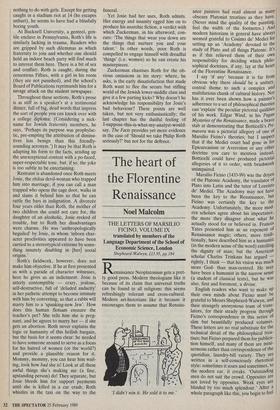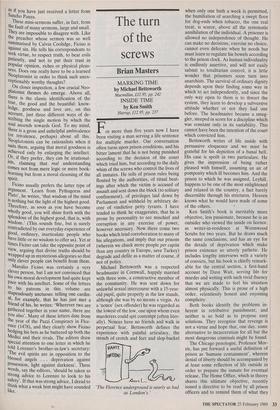The heart of the Florentine Renaissance
Noel Malcolm
THE LETTERS OF MARSILIO FICINO, VOLUME IX translated by members of the Language Department of the School of Economic Science, London
Shepheard-Walwyn, £13.95, pp.184
Renaissance Neoplatonism gets a pret- ty good press. Modern theologians like it because of its claim that universal truths can be found in all religions: this seems refreshingly tolerant and cross-cultural. Modern art-historians like it because it encourages them to assume that Renaiss- 'I didn't win it. He sold it to me.' ance painters had read almost as manY obscure Platonist treatises as they have. (Never mind the quality of the painting, feel the width of the footnotes.) And modern historians in general have always seemed grateful to Cosimo de' Medici for setting up an 'Academy' devoted to the study of Plato and all things Platonic. vs as if this relieved them of their own responsibility for deciding which philo- sophical doctrines, if any, lay at the heart of the Florentine Renaissance.
I say 'if any' because it is far from obvious why there should be a unitary, central theme to such a complex and multifarious chunk of cultural history. Nor has it ever been shown how a painter's adherence to a set of philosophical theories can 'explain' the peculiar pictorial qualities of his work. Edgar Wind, in his Pagan Mysteries of the Renaissance, made a brave stab at demonstrating that Botticelli's Pri- mavera was a pictorial allegory of one of Marsilio Ficino's theories; but I suspect that if the Medici court had gone in for Epicureanism or Averroism or any other doctrine you care to mention instead, Botticelli could have produced pictorial allegories of it to order, with brushwork unimpaired.
Marsilio Ficino (1433-99) was the doyen of the Platonic Academy, the translator of Plato into Latin and the tutor of Lorenzo de' Medici. The Academy may not have been the key to the Renaissance, but Ficino was certainly the key to the Academy. Unfortunately, the more mod- ern scholars agree about his importance, the more they disagree about what he actually stood for or believed in. Frances Yates presented him as an exponent of Renaissance magic; others, more tradi- tionally, have described him as a humanist (in the modern sense of the word) extolling the dignity of man; but the American scholar Charles Trinkaus has argued rightly, I think — that his vision was much more God- than man-centred. He may have been a humanist in the narrow sense (a student of classical texts), but he was also, first and foremost, a divine.
English readers who want to make up their own minds about Ficino must be grateful to Messrs Shepheard-Walwyn, and their strangely anonymous team of trans- lators, for their steady progress through Ficino's correspondence in this series of slim but beautifully produced volumes. These letters are no real substitute for the technical detail of the philosophical trea- tises; but Ficino prepared them for publica- tion himself, and many of them are mini- sermons rather than correspondence of the quotidian, laundry-bill variety. They are written in a self-consciously rhetorical style: sometimes it soars and sometimes, to the modern ear, it creaks. 'Outstanding men do not suit the crowd. Opposites are not loved by opposites. Weak eyes are blinded by too much splendour.' After a whole paragraph like this, you begin to feel as if you have just received a letter from Sancho Panza.
These mini-sermons suffer, in fact, from the fault of many sermons, large and small. They are impossible to disagree with. Like the preacher whose sermon was so well summarised by Calvin Coolidge, Ficino is against sin. He tells his correspondents to seek virtue, to respect truth, to bear evils Patiently, and not to put their trust in popular opinion, riches or physical pleas- ures. Does one really have to be a learned Neoplatonist in order to think such unex- ceptionably worthy thoughts? On closer inspection, a few crucial Neo- platonist themes do emerge. Above all, there is the classic identification of the true, the good and the beautiful: know- ledge, goodness and love are, on this account, just three different ways of de- scribing the single motion by which the soul ascends towards God. To my mind, there is a gross and unhelpful ambivalence (or trivalence, perhaps) about all this. Neoplatonists can be rationalists when it suits them, arguing that moral goodness is achieved only by enlarging the intellect. Or, if they prefer, they can be irrational- ists, claiming that real understanding comes not from mere logic or mere book- learning but from a moral cleansing of the spirit.
Ficino usually prefers the latter type of argument. 'Learn from Pythagoras and Plato', he writes, 'that wisdom of the mind is nothing but the light of the highest good. Therefore, as soon as you have become Wholly good, you will shine forth with the Splendour of the highest good, that is, with wisdom.' (This sounds fine, but is surely contradicted by our everyday experience of good, ordinary, inarticulate people who have little or no wisdom to offer us). Yet at times Ficino can take the opposite point of view, arguing that divine truths should be wrapped up in mysterious allegories so that Only clever people can benefit from them.
Marsilio Ficino was certainly a very clever person, but I am not convinced that his own moral development had quite kept pace with his intellect. Some of the letters to his patrons in this volume are stupendously unctuous: telling one cardin- al, for example, that he has just met a friend of his, he writes: 'Wherever two are gathered together in your name, there are You also'. Many of these letters date from the year of the Pazzi Conspiracy in Flor- ence (1478), and they clearly show Ficino hedging his bets as he buttered up both the Medici and their rivals. The editors draw special attention to one letter in which he told Lorenzo's brother-in-law's secretary: The evil spirits are in opposition to the blessed angels . . . deprivation against possession, light against darkness'. These words, say the editors, 'should be taken as strong advice to Lorenzo to look to his safety'. If that was strong advice, I dread to think what a weak hint might have sounded like.

















































 Previous page
Previous page